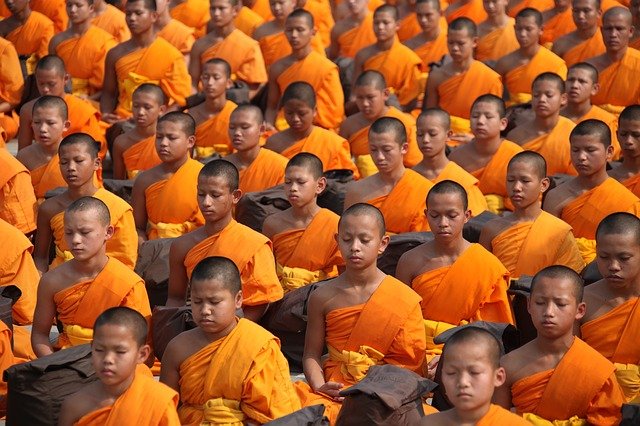Determination or aditthana in Sanskrit is a very important part of mental cultivation. Without determination, it would not be possible to accomplish any goals. Aditthana is accompanied by effort and patience. It is not about making wishes but treading on the path we have decided to walk.
Aditthana is not about making wishes
Here in Thailand, people practice generosity by giving to the monks and the monastery. After that, they make determinations such as “May I be born in the time of the Maitrya Buddha.” It is believed that if you are born in the time of the next Buddha (which is Maitrya Buddha), it will be easier to attain enlightenment.
Maitreya had made so many determinations in his past existences as a Bodhisattva that he wants to create a time that is extremely wholesome and good for human beings to attain liberation. Buddhists uphold five precepts (refrain from killing, stealing, sexual misconduct, lying, and consuming intoxicants) and it’s believed that in Maitreya Buddha’s time, every human being will naturally preserve these moral laws. It is easier to receive teachings leading to the end of suffering when our sila (virtues) are kept.
Others with lower levels of aditthana make offerings to the monks and make wishes to win the lottery. But making wishes is not aditthana.
The meaning of aditthana
Aditthana parami is about making an effort. We always return to our determination to adjust how we tread the path to make an end of suffering. As unenlightened beings, we may stray off the practice. Having determination will help us to come back to the path again and again.
Determination will help us reach the goal we want to reach. It is very important to repeat aditthana – to create wholesome actions (in body and mind) repeatedly. It helps us build merit in our hearts. Our lives are affected by causes and its results, also known as karma and vipaka.
Karma and vipaka happen all the time. If we perform good actions, it will bring about good results. Bad actions bring about bad results (suffering).
Determination helps us remember our purpose
We usually act without determination and we are unaware of the causes and results. Whenever we do wholesome things, we can guide the result in a certain way. For example, when we do good we can make a determination such as, “May my actions result in the happiness of all sentient beings or in my own enlightenment.”
The power of determination is in guiding our meritorious energy in a certain direction. If you don’t do that, you will still receive positive results from every positive action. But there is no direction to guide these merits without determination.
Determination makes our actions powerful because all of the merits come together for a purpose or direction and it gets impressed into our minds. Having determination is like having a plan. Even if things become difficult or boring, you know where you want to go.
Differences in Theravada and Mahayana Buddhism
Adittana Parami in Theravada Buddhism is the determination to surrender to values and practices leading to the end of suffering. This is done by orienting the mind to the development of wholesome qualities.
In Mahayana Buddhism, the focus is on pradnidhanna. Pradnidhana means making a wishful prayer to fulfill a mission. It gives us a clear view of where we want to go and to strengthen the qualities inherent in us. It helps us to persevere and to be faithful to our goal of attaining enlightenment.
Adittana is about having the determination to practice to reach the goal. Pradnidhana is similar but has to do more with wholesome prayers. In Mahayana Buddhism, we speak about Buddha-nature. But it is covered from our perception, so we remove ignorance through our faith and prayers.
Both adittana and pradniddha are very similar but the attitudes are different. The late Dilgo Khyentse described pradnidhana as finding joy in virtue and positive actions. The historical Buddha himself made a strong determination before enlightenment. He was determined not to get up until he attained it even if his flesh were to fall off his body.
Gradual practice in developing determination
We may not have the determination like that of the Buddha. But we can increase our level of determination slowly by raising the level each time and believing that we can reach the goal.
For example, we can make the determination to practice meditation 20 minutes a day. But when we make determinations, obstacles will also arise. When I was practicing in the younger days, I was determined not to get up until the incense finished burning. It was not a problem for me to sit for an hour without moving. But every time I made a determination, it might become unbearable to sit. Pain may suddenly arise or someone may knock on your door.
However, if you do not make a determination or burn an incense stick, the meditation itself may be easier. I used to practice under a teacher, who used to teach us to raise our bar slowly. He would also caution new monks, who have strong determination to be monastics forever to keep their options open. That is because he was aware that strong determinations often bring strong obstacles. Temptations can become very powerful and monks often disrobe because they cannot deal with them.
How to train in aditthana parami?
If you want to practice generosity, make a determination to follow it. It is not enough to want to be generous, you need aditthana to put it into action and really practice generosity. Having the determination to practice sila or virtues is also very helpful for the practice. Being a person with moral standards makes you trustworthy.
You can also make determinations to enter meditative absorption for 5 to 10 minutes in your meditation practice. Make aditthana that you can achieve and slowly increase to perfect this mental quality. Next time it will become easier.



